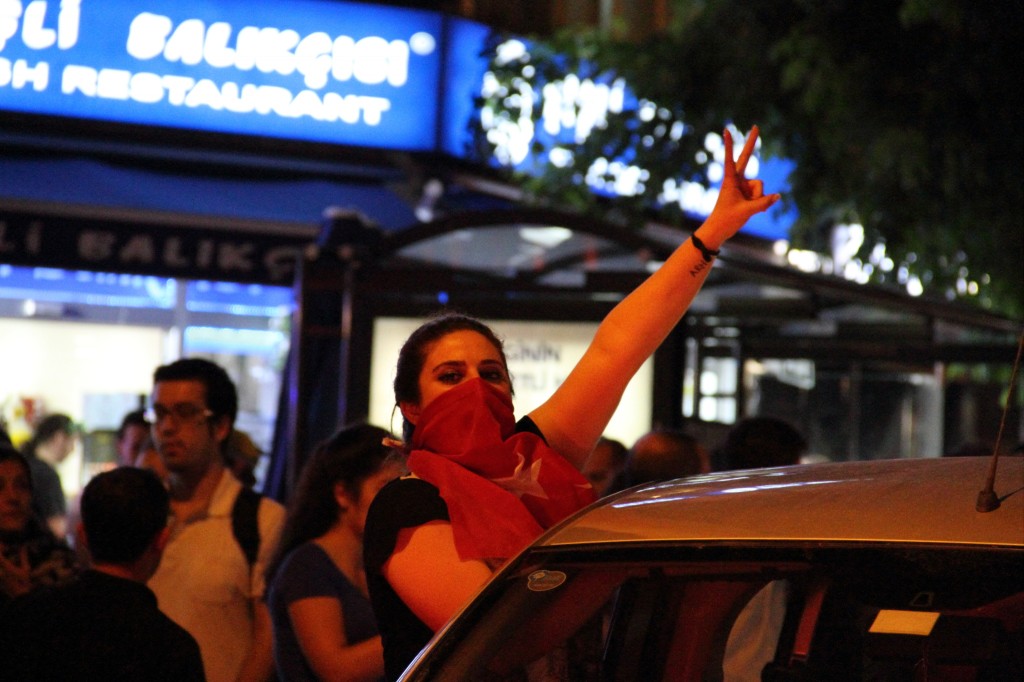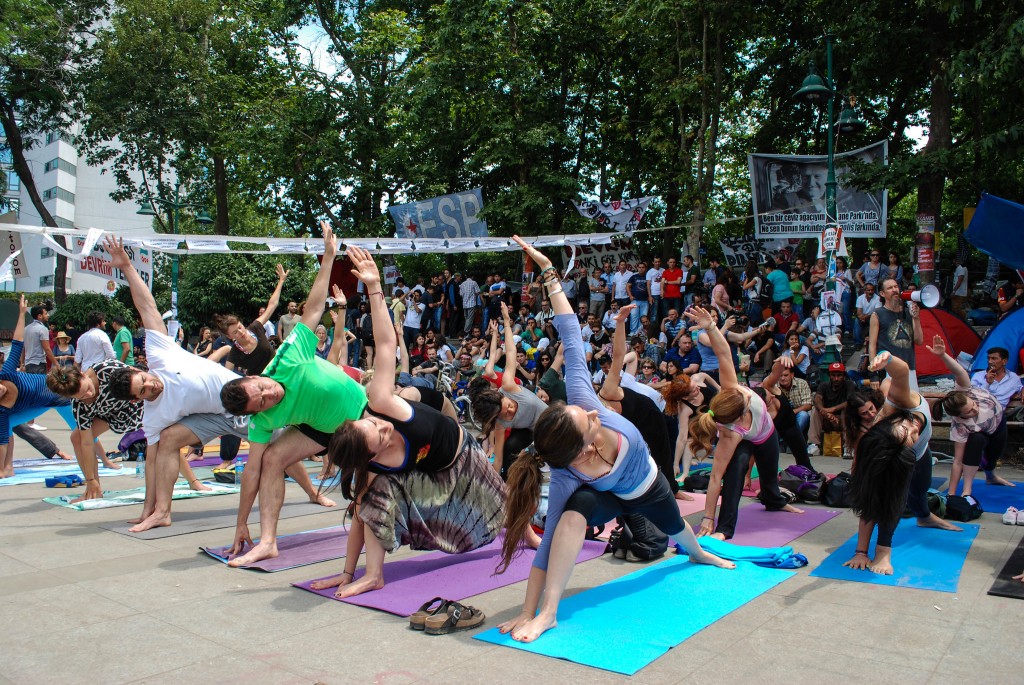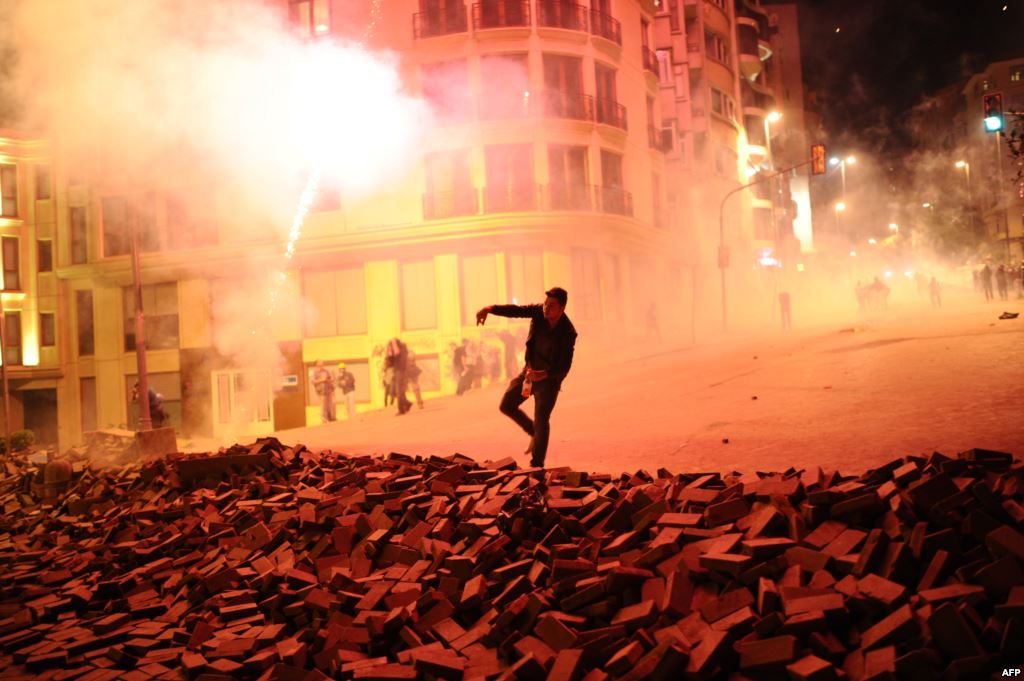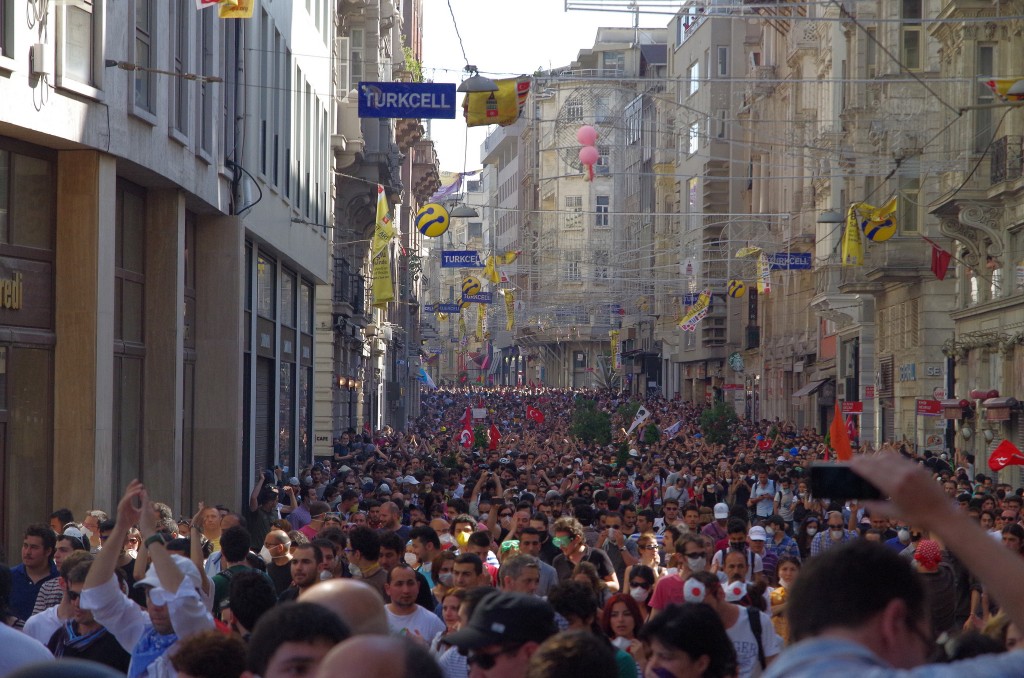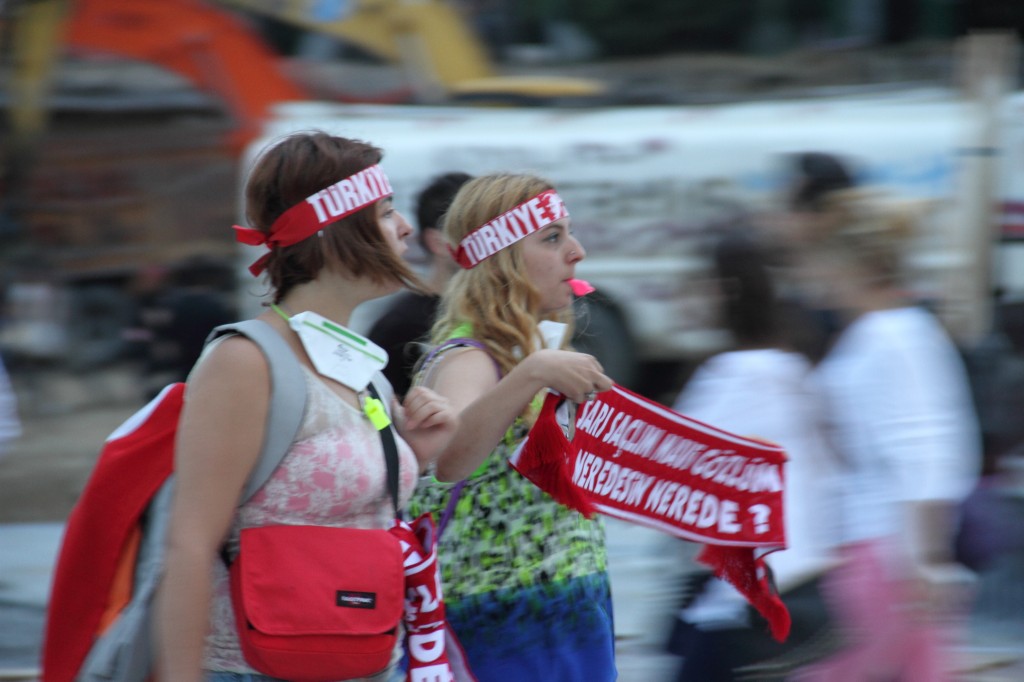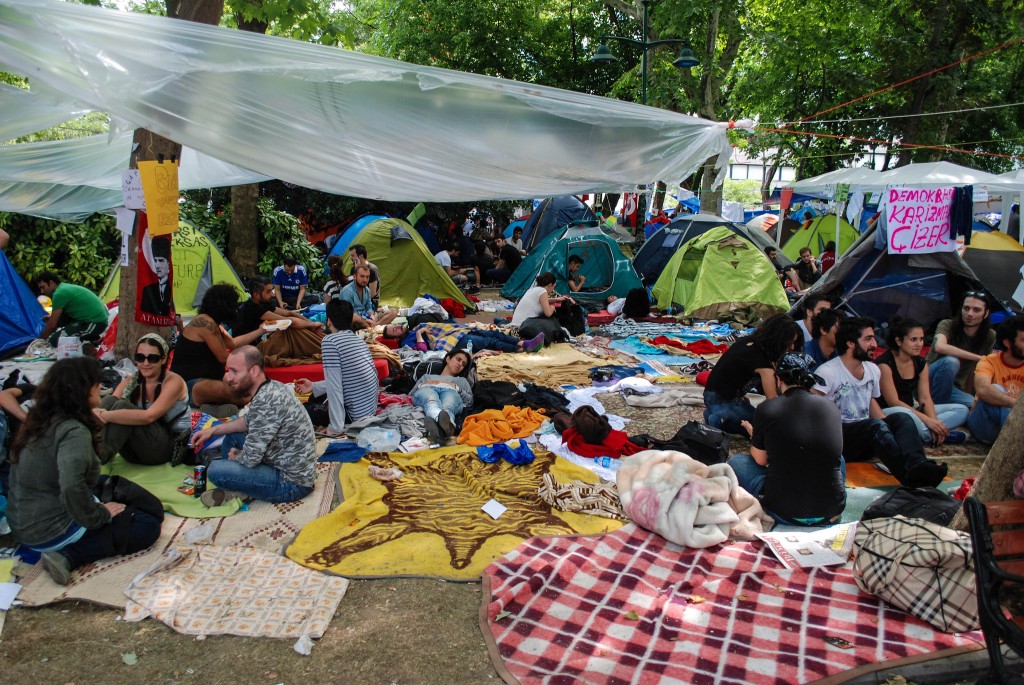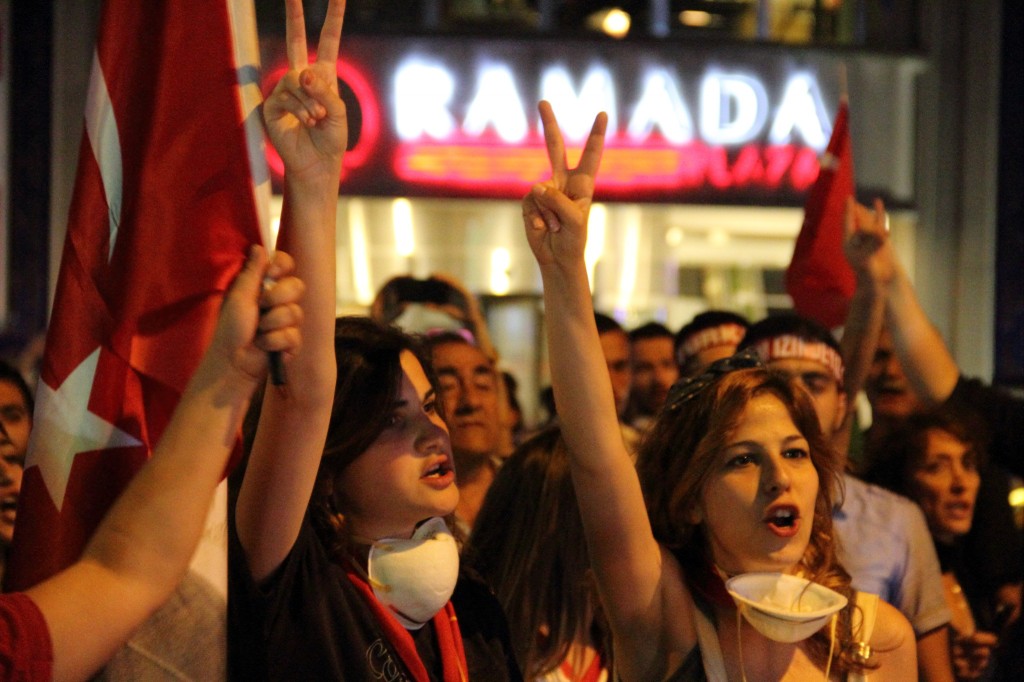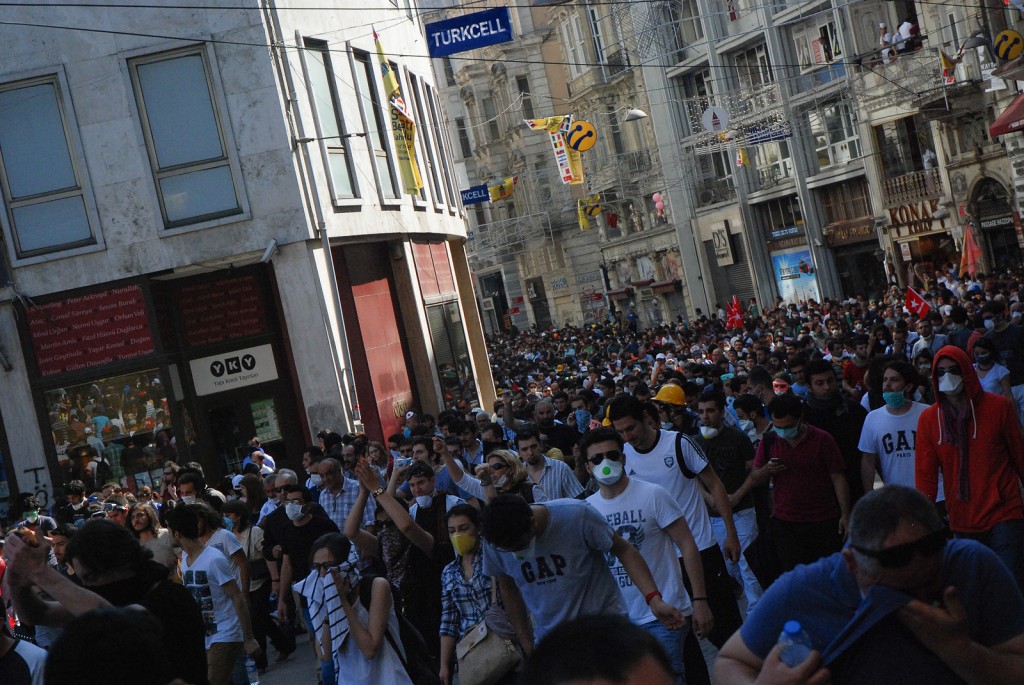Some see it as a modern democracy with an Islamic tint, an improving, reforming country. But if you were in Istanbul during the last month and a half, you’d have seen something completely different: a violent, authoritarian, increasingly suppressive regime. Tales from the Dark Side, Turkish style.
I’ve always been a critic of armchair reporting. But when your armchair is four blocks away from Taksim Square, it has one of the best views of the uproar in Istanbul any diligent reporter could ask for. I’m now able to calculate with great precision the time between the beginning of the screaming, the sound of the shot, and the entry of the gas through my window. It’s two and twelve seconds respectively.
In the past month, Americans have seen violent images from Turkey on their television screens: massive clouds of tear gas, the sound of screams and sirens, lots of Turks looking mad as hell.
What’s it about? Another outburst of Muslim rage? Something about kids camping in a park? Isn’t Turkey supposed to be the model moderate Muslim miracle?
But understanding the explosion of violence pitting demonstrators against Turkey’s authoritarian and increasingly heavy-handed state—and why it surprised so many who should have known better—requires some work. Start by forgetting most of what you’ve been hearing for the past ten years about Turkey. Don’t try to compare it to any other country: not America, not Afghanistan, not Egypt, not Syria, not Iran, not Russia, and certainly not France in 1968—not that the latter would occur to you, but the French press seems crazy for the idea.
Here’s what you need to know, bare-bones: The supposedly secular Turkish Republic founded by Mustafa Kemal Atatürk almost a century ago was an authoritarian state, although not a totalitarian one. And yes, Jeanne Kirkpatrick was right, there is a difference. I went behind the Iron Curtain when the Wall was still standing. The USSR was indeed—immediately, visibly, on first sight—an evil empire. The Turkish Republic wasn’t remotely like that; there has never been all-encompassing government enslavement of the citizenry here, nor is there now, and I pray there never will be. But since its emergence after World War I, Turkey has always had weak institutions—and a state that’s strong as an ox.
Over the decades, the authoritarianism has come in different flavors. Once they served it state-worship style, and from time-to-time military style; now they serve it piety style. But it’s still the same thing. They just changed the wrapping paper.
Piety-style Turkey is better off economically, though not as much as you’ve been told. Still, even considering the past few weeks’ horrific events, even considering the preposterous show trials, the increasing displacement of state-worshipping authoritarians by piety-style authoritarians in Turkey’s institutions, the jailing of journalists, the censorship of the Internet, the almost unfathomable dishonesty of its government and its intellectuals, the cronyism, the corruption, the foreign policy misadventures as its government shows support for Hamas and flouts the Europeans and declares Zionism to be a form of fascism—despite all of that, it’s probably a better place to live, for most of its citizens, than it has been at many points in its recent so-called secular past.
And Turkey was never truly “secular,” at least not in the way Americans understand the term. True, after the founding of the Republic, Islamic courts were abolished and replaced with a secular legal apparatus, often modeled word-for-word on the Swiss, German, and Italian civil and penal codes. But a state-funded and state-controlled institution, the Diyanet, was one of the first organizations established by the Turkish Parliament after the abolition of the Caliphate in 1924. It was founded “to execute works concerning the beliefs, worship, and ethics of Islam, enlighten the public about their religion, and administer the sacred worshipping places.” Those would be the ethics of the Hanafi Sunni school of Islam, not the Eleusinian Mystery cults—or any of the religions of the 20 percent of the Turkish population who aren’t Sunni Muslims. The point is that religion in Turkey has always been subservient to, and a tool for, the state. When the state decides it’s important, the Diyanet can tell the Imams—all the imams, if they want to stay out of jail—what to put in their sermons. None too secular, that. Neither is the increasingly visible Islamic discourse of today’s ruling elites, nor that of the civil servants who work for them.
Turkey is a rarity in the Middle East. It’s a democracy with free elections. It has a secular constitution. It’s a member of NATO. And every so often, it goes nuts and kills its own citizens.
So Turkey is a rarity in the Middle East: It’s a democracy, if only in the sense that it does hold regular, free elections, and it has a secular constitution. It’s in NATO, and it furnishes NATO’s second-largest army—and its leading army, if you use the criteria of “percentage of admirals and generals in jail.” It provides a crucial energy corridor to Europe. The Incirlik air base has a vital staging point for the US military, for the most part. It has made a reasonable contribution to the coalition forces in Afghanistan, and agreed to host a radar system designed by the United States as part of its NATO shield against a missile attack aimed at Europe.
And every so often, as sort of a national tradition, Turkey goes nuts and kills a few—or more than a few—of its own citizens. The Dersim rebellion in 1937 and 1938 was suppressed with such vigor that historians suspect tens of thousands of souls perished. The civil war with the terrorist PKK is said to have claimed 40,000 lives. At the height of the conflict, in the 1990s, thousands of civilians were systematically rounded up and—with no trial—jailed and tortured and disappeared.
And shall we mention not only the military coups, but the events that led up to them, such as the clashes in the 1970s between far-left and far-right paramilitaries, which created such chaos and anarchy—killing, on average, ten people a day and toward the end, 20 a day—that the public was relieved, yes relieved, when the military finally stepped in? They whitewash that effusion of relief right out of history here these days, but ask anyone old enough to remember it, just remember to ask them in private. They wanted that junta, and badly, until the junta began doing what juntas tend to do, with one very important exception: After finishing up the torturing and the hanging, they returned the government to the civilians.
So we should not for a moment imagine that the events of the past weeks have been some hideous aberration from the otherwise irenic and secular history of the Turkish Republic.
Yet, in the past decade, since the rise of Prime Minister Recep Tayyip Erdoğan and his AKP party, the world has decided that Turkey is finally democratizing—and this precisely as the screws have in fact tightened around crucial pieces of what you would call an ordinary democratic civil discourse and judicial norms. Indeed, Erdoğan has so thoroughly undermined free civic expression and the rule of law that a great many Turks feel that their country has been ripped from their hands.
Military leaders are in jail. Journalists are in jail. Professors are in jail. Elected parliamentarians are in jail. This has been going on for years now, though rather ignored by many in the West. And when the government this spring decided to go medieval on a few tent-dwelling, yoga-practicing, tree-decorating youths trying to save an Istanbul park, many of us felt a kind of stomach-churning inevitability, accompanying the breaking of bones and the unbreathable air.
April 2: A rumor starts going around that people are trying to organize a protest to save Gezi Park. People here protest a lot, so I don’t pay much attention. On weekends you can often see five or six protests a day in Taksim Square. Usually no one notices them. The police watch them benignly, and the protests make no difference at all, especially since they’re always uniquely boring. The slogans are ritualized, it’s always “shoulder-to-shoulder against something” (be it fascists or whale-killers), and everyone goes home at the scheduled time and nothing ever changes.
But this rumor is a little different, because the organizers claim that 50,000 people have already signed up for it. That’s a lot of protesters. I mention this to a friend, en passant. He’s pretty shrewd about Turkey, being Turkish. He says, “If 50,000 people actually signed something and a sizable fraction shows up, I don’t see the AKP tolerating this. Even the anti-censorship march drew inane bile from the heavyweights of the AKP newspapers.”
“Or they’ll be ignored,” I say. “But I wish them well.”
“There’s a fairly good chance they’ll get hit and gassed,” he replies. I should note that “hit and gassed” happens so often here lately that we barely notice it anymore. We just check the #dailygasreport on Twitter to see what streets to avoid. It’s like traffic: one of the hassles of Istanbul you learn to deal with.
“Maybe,” I say, and then make one of my less prescient predictions. “Of one thing I’m sure—unless, say, 50 Buddhist nuns set themselves on fire, or an American tourist is bludgeoned by a glue-sniffer, no one outside of Turkey will be interested.”
It takes a few weeks for me to be proven quite wrong.
May 31: The police burst into Gezi Park at dawn with tear gas and water cannons. More than a hundred protesters are injured, including three journalists. By eight that evening, some 100,000 more return to the area to try to defend it. The police block the roads leading to Taksim Square with barriers and try to disperse the crowds. Within hours, the protests spread throughout Istanbul, and then to other cities.
At three in the morning, a massive crowd begins marching across the Bosphorus Bridge from Asia to the European side. People join the protests from their houses, shouting and clapping, and banging pots and pans—a tradition inherited from the Ottoman era, when Janissaries warned of their imminent mutiny by banging on cauldrons—
And as all of this is happening—and broadcast around the world by foreign news services—Turkish television is showing anything but these scenes. CNN Türk aired a documentary about penguins.
June 1: Hundreds of thousands of demonstrators in more than 40 Turkish cities keep protesting. The protesters move to the office of Prime Minister Erdoğan in Beşiktaş, providing the police with an excuse for even harsher retaliation. Every living being in the district gets showered with tear gas—including, I’m told, the officials in the office, which at least was satisfying to imagine, if it’s true. Ankara and Izmir rise up in force.
Snippets of conversation:
“They’ve got to be running low on tear gas.”
“They saturation bombed this part of the city with gas, how much can they possibly have?”
“Be careful. My brother got gassed today, too.”
“This is just ridiculous. What the f*** are they thinking?”
“I hate this f***ing gas. Was a bit late to shut the windows and now I can’t breathe.”
“Ok, no way to get anywhere near Taksim from here. They’ve blocked Vali Konaği Avenue with a bus. I haven’t seen any gassing, but judging how hard it was for me to breathe and the way kids were taunting the cops to take off their masks and helmets, I imagine they’re gassing them regularly.”
“People were walking back teary-eyed and coughing on Cumhuriyet Avenue. Halaskargazi was crowded with people in surgical masks. Folks were mumbling obscenities, but I saw no tendency towards violence or anything like that. Oh, and they blocked the rear entrance of the governor’s residence with fire trucks.”
“Why the f*** are they provoking this, I wonder? Completely lost it?
“I get gassed at home and walk by the semi-dispersed crowds and breathe the gas. I can tell you, though, the people I saw were ordinary people. Just frustrated.”
June 3: A Tweet from journalist Orkun Ün: “I have just spoken with a police chief, these are his exact words: ‘The country is finished, may God help us all. We got direct orders from the prime minister to break up the protests.’”
June 4:Deputy Prime Minister Bülent Arınç announces that 244 police and 60 protesters have been injured in clashes. The Turkish Doctor’s Union, on the other hand, puts the number of injured protesters at 4,177, including two deaths and multiple blindings. NGOs such as Human Rights Watch suggest the number of deaths and injuries may be much higher. Journalists debate among themselves how to report the number of casualties. We’ve seen what’s going on. We know whom to trust. We settle on “more than 4,000.”
Later that night, heavy protests break out in the eastern province of Tunceli. The police are forced to call for help from the military in Antakya, on the Syrian border, although they end up staying on the sidelines. In İzmir, police begin detaining people for suspicion of Tweeting “provocations” and “misinformation.” “Provocations,” apparently, include such Tweets as “Please don’t act in unrestrained ways and don’t assault the police.” The state says they picked them up for taking pictures of buildings they set on fire and gloating about having done it on Twitter. Probably both are true.
We’re all getting paranoid. We start writing emails to each other like this: “Let me just say, once again, how much I love our police and how much I appreciate their intelligence capabilities and diligence. And their unique manliness, their rugged good looks, and their unparalleled loyalty to God and country. Fine men, one and all, and I am honored to share my correspondence with them. I only hope my small contribution might contribute to the glory and power of Turkey, I mean Türkiye.” (Once, they decided to rebrand. They’d had it with the Thanksgiving jokes.)
June 5: I receive an unbearable letter from a local human rights group:
Last night (June 3, 2013) around 9 p.m. I was detained in Beşiktaş, at traffic lights on Barbaros Avenue. I was not involved in any action like swearing or throwing stones. They took me in bending my arm the moment they saw me. Some friends of mine saw on TV how I was taken into custody. Then hell began.
After crossing the lights in the direction of the seaside, while I was at the edge of the platform where the IETT bus stops are at the seaside, any policeman who was there and any riot police squad member (çevik kuvvet) who saw me started kicking and punching me. For about 100-150 meters, in other words, all the way to the Kadıköy ferry station, whoever was present there was kicking and punching. Insults and curses such as “Are you the ones to save this country, motherf***rs, sons of bitches,” never ended. I could not count how many people hit me before I reached the detention bus. Just as I was taken near the buses, a few policemen called from behind a bus, “Bring him here.” They took me behind the bus and started kicking and punching me there. I learned later that because of the cameras they took me behind the bus to beat me.
When I was inside the detention bus (İETT) the lights were out, and I heard a girl’s voice begging inside the bus: “I did not do anything, sir.” I could not even see who was hitting me as I was taken inside the bus and after I was in the bus. The only thing I was able to do in the dark was to cover my head. Curses and insults continued. I sat. Everyone who was passing near me was hitting me. I got up and went to a corner. They wanted me to take a seat again. I told them everyone who passed by was hitting me when I was seated. They again swore, slapped and punched me and made me sit. They were hitting the girl and throttling her. A civilian policeman whose name is Suleyman told the girl, “I will bend you over and f***, right now.” Response of the girl was heartbreaking. She could only say “Yes, sir,” with a low voice.
And next, we, the three people present at the bus, were forced to shout: “I love the Turkish police. I love my country.” They made us yell this again and again ordered us to make it “louder, louder.” The insults and beating did not come to an end.
The atmosphere seemed a bit calmer, as they brought another young person. The guy’s nose was broken. When I asked him why he didn’t protect his face, he told me, “Two people held me by force and a third person punched my nose three times.” From time to time there were others brought in….
Once we were at the police station, an army of lawyers was waiting for us. And the policemen now were talking to us on polite terms.
I want to thank all the lawyers, all our friends who called the lawyers and everybody who was worried about us. There is not a bit of an exaggeration in this piece. Everything that has been experienced is true and my only aim is for everybody to hear it firsthand.
Oh, by the way, they detained the lawyers too. A few days ago, I think. I ask a friend whether the account above could possibly be true. He laughs at my naiveté. Laughs hard.
“This is not our country,” wrote Turkish novelist Tezer Özlü, “this is the country of those who want to kill us.” Indeed, the past few weeks have been Tezer Özlü weeks. The police killed five of their fellow citizens—and probably more—and blinded nearly a dozen of them in an explosion of violence so convulsive it shocked the country. It should also be noted that a policeman died, too, chasing his fellow citizens. But these words don’t begin to encompass the cruelty meted out by government agents acting against its citizens.
I live by Taksim Square. It is not clear what set it ablaze one Tuesday evening, but certainly something did; police stormed a crowd of some 30,000 with massive clouds of tear gas and sound bombs, setting off a stampede. Extremists in the crowd began fighting back—throwing stones, setting off fireworks, starting fires to mitigate the effects of the gas, transforming what had just the day before been an irenic, quirky festival of a protest into a nightmare of nihilism and violence, the sound of the ezan in the background adding surrealism to the sacrilege and vice-versa. The police behaved like animals. I saw it. They terrorized and maimed and wounded and traumatized a bunch of goofy kids whose only crime was camping out in a park, as well as everyone in a mile-wide range of them. God only knows what they did in the parts of the city and country where the media wasn’t looking. I’m not even sure I want to know.
But keep this in mind: They did not shoot them with live bullets. This wasn’t a Syrian-style wholesale slaughter, and as I said, brutality and human rights abuses in Turkey were hardly unknown before the rise of the AKP.
What is an aberration, and utterly inexplicable to me, is this: Since the AKP came to power in 2002, the world somehow ceased to care, or to ask any deep questions, about whether Turkey’s “democratic deficit,” as it’s euphemistically known, has really healed, or is apt ever to heal given the AKP’s style of governance.
Turkish brutality is not new. What’s new is that since the AKP came to power in 2002, the world somehow has ceased to care about whether Turkey’s “democratic deficit” will every get any better.
What is that style of governance? To amass power—of every kind—and distribute the spoils to its supporters. The media? An impediment. Lock it up, buy it up, or terrify it into silence, with a special emphasis on imprisoning lots and lots of journalists. Critics? No use for them: Sue them, slander them in the media, imprison them, or chase them out of the country to evade prosecution (for crimes that in all likelihood have been committed in one form or another by nine-tenths of the Turkish elite).
The Paleolithic, but at least independent, judiciary? Its independence is now gone, and I cannot believe that the West was so stupid as to celebrate the vehicle of its execution as a democratic advance, rather than see it clear-eyed for what it was—and scream bloody murder.
In a move underscoring Erdoğan’s skill at amassing power, the independence of the judiciary disappeared in a 2010 constitutional referendum, one with 26 items bundled into a single package. Voters couldn’t select the items they wanted: It was thumbs-up or thumbs-down.
Of the items, 24 were innocuous or salutary, one was dubious, and one was the poison pill. It restructured the size and membership of the Constitutional Court, raising its membership from 11 to 17, and took the power of the Supreme Court of Appeals and the Council of State to elect and appoint its members and assigned it to parliament and the president. This was in addition to Erdoğan’s pre-existing power to hand pick all of the MPs in his party (the legislative branch) and all of the ministers in his cabinet (the executive branch). So the majority of the judiciary, including the members of the Constitutional Court, are now elected by a parliament dominated by MPs entirely under Erdoğan’s control. There goes the independent judiciary.
What’s more, a 2007 constitutional referendum resulted in the direct election of the president, the president, a role that is often considered ceremonial but actually has the power to veto legislation and is therefore really quite crucial to the fate of the country, by the public. Before this, the president was elected by parliament, and viewed as an oppositional figure whose role was to limit the power of the prime minister through the veto. Now, however, his election is plugged into the same personality cult machine that runs everything else. To put it succinctly, in two referenda—which the world applauded like maniac penguins as great advances for Turkish democracy—the prime minister directly or indirectly took control of all three branches of the government. This is unprecedented in the history of Turkey’s post-World War I state apparatus.
The last leg of the balance-of-power stool was the military. So off to the clink went the top brass, who rotted behind bars for years before being convicted; they will wait years more for the European Court of Human Rights to review their appeal. Some have already died in jail, and more will surely die before the case makes it to the top of the ECHR’s overcrowded docket.
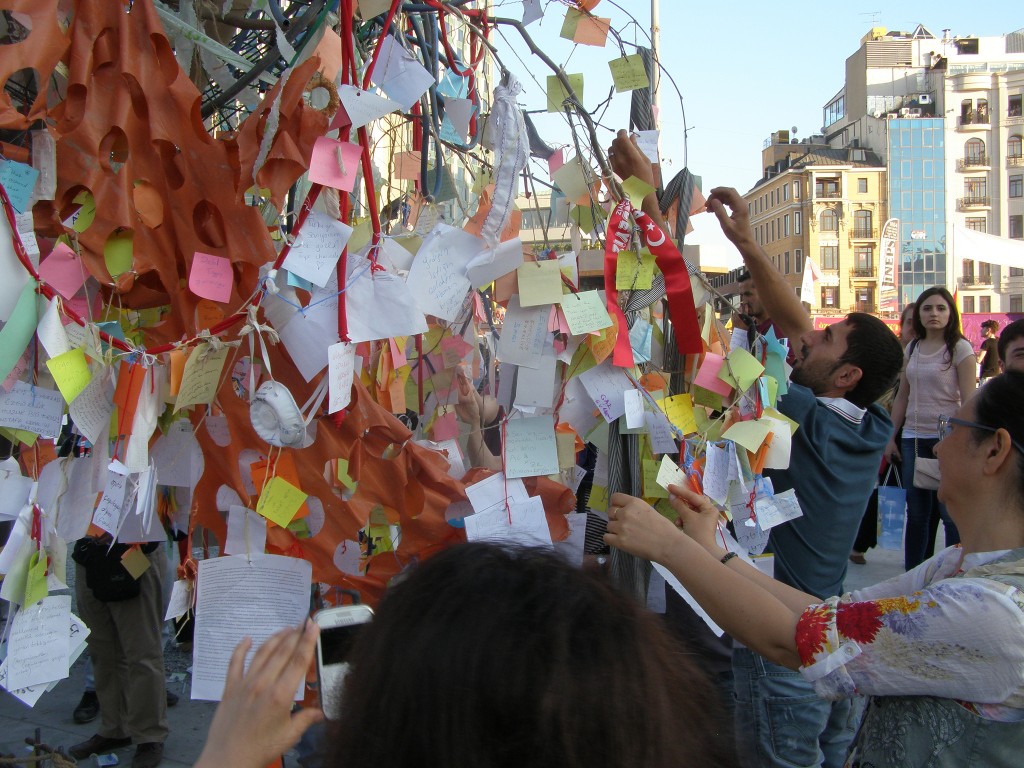
The Wish Tree, created by artists and protesters, was burned by government forces on June 15. Photo: resim77 / Flickr
And the Kurds? Well, the word a few weeks ago was peace, but the word last year was war, with the highest casualties—some 700 dead—in 15 years—and it seems, though it’s hard to say, that the word may be war again quite soon.
Now tell me: Islamist or not, can’t you see what the problem is here? A country already cursed by its authoritarian traditions managed to hand all of the power to one single man. Absolute power corrupts absolutely, and this man now has absolute power.
To make matters worse, Erdoğan has been feted around the world, including by people who should surely know better, as the greatest democratic reformer since Benjamin Franklin, which did little to enhance his grasp on the Reality Principle.
So nobody should be surprised when we hear the sound of screams and sirens in Taksim Square, Turks looking mad as hell, and massive clouds of tear gas over Istanbul—not to mention Ankara, Izmir, Antakya, Adana, Eskişehir, Muğla, Mersin, Bursa, Balikesir, Kocaeli, Antalya, Rize, and God only knows where else, because the international media is focused on Istanbul chiefly and Ankara as a footnote, and the domestic media is muzzled. Really, the only surprise is that it took this long.
June 6: Delivering a speech from Tunisia, the prime minister defiantly vows to demolish the park and promptly crashes the stock market.
Here, people are going insane. There are rumors—sparked by an idiot comment posted on the CNN iReport webpage—that the cops are using Agent Orange. No one here has a clue that CNN iReport is not “official, trustworthy Western journalism,” or even what Agent Orange is. They just know it’s something really, really bad. The irony of this—that Agent Orange is a defoliant and that the very point of this protest (ostensibly, at least) is to manifest discontent with Istanbul’s near-absence of trees—is not lost on the few of us who speak English and have some familiarity with the Vietnam War.
We try to explain on Twitter that the gas is probably colored with something orange because the cops want to identify and arrest the people they can’t manage to catch right away. In retrospect, I suspect, this only somewhat reassured them.
June 7: Calm and peaceful, save for incidents in Cizre, near the Syrian border (tear gas, sound bombs, rubber bullets, stones, Molotov cocktails), and the Istanbul neighborhood of Gazi (unrelated to Gezi). A protester there was hit in the head by a gas canister the previous night and is still in critical condition. Clashes there continue throughout the night (barricades, tear gas, water cannon, slingshots).
Compared to days prior, though, my own neighborhood is quiet. The police have pulled out of Taksim. I go for a walk through Taksim and Gezi Park and can’t believe what I’m seeing: It looks like freedom. For the first time ever, maybe. I walk through Taksim all the time. I live right by it, and it’s always full of cops. Don’t get me wrong: They are there for a very good reason. The PKK and its affiliates have attacked Taksim four times since 1995—I was nearly one of their victims the last time they did it. Istanbul is a city of at least 12 million people, not all of them pleasant (though most of them are), and Turkey lives in the world’s roughest neighborhood. Obviously, yes, you do want a heavy police presence in the city’s most heavily trafficked square and its most obvious terrorist target.
But Taksim is a lot more fun without the cops, especially when lately they’ve been more of a threat than the PKK. The place has become a giant carnival almost overnight: Singing, dancing, improbable comity among groups that under normal circumstances would prefer to be killing each other—nationalists and communists, Turks and Kurds, Alevis and Sufis, all thrilled to be there, thrilled not to be choking on tear gas.
An overturned police van (the only sign that they were ever there) has been turned into a makeshift memorial to the wounded and killed, with handwritten messages promising them that they won’t be forgotten and it won’t be in vain. I hadn’t really cared about Gezi Park before, to be honest, but if it had stayed the way it was that night, I’d care.
Again I’m baffled, just baffled, by the prime minister’s determination to destroy this place. What a tourist attraction this could be! “Joyful, harmless festival” versus “multiple subdural hematomas and packed casualty wards”—you’d think that would be a no brainer, right? It’s all so innocent that even the streetwalkers and the drunks I usually see on the streets around Taksim have, for some reason, decamped for seedier pastures. I keep thinking that if only Erdoğan would visit the place, he’d see there was nothing to fear.
But apparently that wasn’t his plan. Later that night, he returns from Tunisia. While publicly AKP officials announce that there will be no fanfare at the airport for fear of further aggravating the tension, half of Istanbul receives text messages from their local AKP branch instructing them to show up at the airport to show their support. Buses will be provided. Public transportation will be open late. Crowds of thousands greet him, chanting his name ecstatically. “I salute my brothers who are here in Istanbul,” he says, indefatigable even after all that traveling. And he continues: “In Istanbul’s brother cities, Sarajevo, Baku, Beirut, Skopje, Damascus, Gaza, Mecca, Medina. I salute Istanbul again and again with all my heart, every Istanbul neighborhood, every street, every district.”
The crowd, perhaps, didn’t catch that last part. “Ya Allah, Bismillah, Allahu Akbar,” they roar. “Let us go, we’ll crush Taksim.”
Wait, he tells them, you’ll have your chance at the ballot box.
June 13:The prime minister says, “This will all be over in 24 hours.” People old enough to remember the ’70s are getting worried. Yes, plastic bullets are bad. Real bullets are worse.
June 15: The police burst into Gezi Park. Hours before, parents were there with their kids, planting gardens. They clear out the media first, then go in with water cannons and flash-bangs and start tearing up the tents. They attack the medical tent, too. It’s rumored that one of the medics has a nervous breakdown because the wounded are being attacked. Panicked crowds run to the nearby Divan hotel. Tear gas and stun grenades are shot down neighboring roads. Police gas women with children in their arms.
At the Divan Hotel, the lobby is full of vomit—everyone is vomiting because the police are shooting gas directly into an enclosed space. Many are wounded. The police warn that they’ll arrest anyone who comes out. No one, but no one, has any clue why they’re doing this.
Thousands try to march to Taksim Square in solidarity. The police gas them all. They kick and assault a cameraman trying to film the Divan Hotel. Sound bombs and tear gas no longer seem to frighten the crowd as much as they did. I worry this will prompt the cops to move up to something that will. The police burn the “wishing tree” in Gezi Park where protesters had hung messages with their dreams, and cart everything else off in dump trucks.
Finally, the police allow ambulances into the Divan to take out the injured. But they keep gassing for miles in every direction. The US embassy is completely silent—not even a pro-forma call for “restraint on both sides.” The British consulate is not quite so silent. They Tweet, “@LeighTurnerFCO #istanbul 0045-tear-gas becoming eye-watering at #British Consulate-General c 1 km from Taksim Sq.”
Chief Negotiator and Minister for EU Affairs Egemen Bağış announces that anyone in Taksim Square will be “treated as a terrorist.” In Turkey, this usually means “jailed for life or shot on sight.” His years of patient negotiations with the EU are undermined when police burst into and gas the Hilton Hotel, dousing Germany’s Green Party co-chair, Claudia Roth, with astringent chemicals that leave her skin so red it’s practically fluorescent. I saw the photos. Not even fury can account for a human face turning that color.
They fire tear gas into the hospital near my apartment. I had pneumonia once; they treated me there. I think about the effect this must be having on the lung patients who are there now. If this were a war, attacking a hospital would be a flagrant violation of Article 56 of the Geneva Conventions. Indeed, if this were a war, the record of the day would include notable violations of Islamic law, too. The first Caliph, Abu Bakr, was exceptionally clear on this point: “Bring no harm to the trees, nor burn them with fire, especially those which are fruitful.” And that’s only the most obvious law that comes to mind. They’ve also violated the Turkish constitution in ways too countless to mention, but that’s been going on for so many years that pointing it out seems as obvious as noting that objects unsupported fall toward the earth. The major networks in Turkey have returned to their regularly scheduled programming. On SkyTurk 360: a fascinating history of traditional tea and coffee cups.
A Tweet that sums up how many are feeling: “Let me take this opportunity to thank Erdoğan’s international cheerleaders for the monster they’ve co-created. Oh, & f*** you @FareedZakaria.”
June 16: Yeni Şafak, said to be the prime minister’s favorite newspaper, devotes its front page to the revelation of a Jewish, Armenian, and CNN sex-scandal plot against Turkey. In Ankara, police are preventing demonstrators from approaching Kizilay square, where slain protestor Ethem Sarısülük’s funeral is to be held. It’s Father’s Day, and people in neighborhoods miles from mine are doing their Sunday shopping in gas masks. The police won’t reveal where they’re detaining the people they arrested the night before.
The Prime Minister is furious at the media. “If there are those who really want to know about Turkey,” he declares, “they should come and try to understand the AKP. It’s the truth.” In other words: The nation is the party, the party is the nation.
Meanwhile, the Istanbul governor says that while he respects medical science, he urges medics not to treat protesters. (Hey, docs, too bad about that Hippocratic Oath.) U.S. Embassy silent as an Antarctic graveyard. The Turkish journalist Ilhan Tanır, who is in Washington, tells me that he spoke to a White House official late the night before. They have no updated comment on the situation.
In the afternoon, the prime minister holds a massive “Respect for the National Will” rally in Istanbul. The state media news agency covers it with extra-special Baghdad-Bob-Pravda-c.1956 sauce: “LIVE: Erdoğan says international media is alone with their lies.” They report, too, that an AKP official says the Taksim protests were planned by the “American Entrepreneur Institute.”
The AKP rally ground is packed so tightly that, according to a Bloomberg reporter on the scene, five women have been carted off for treatment after fainting. Erdoğan scolds the European Parliament: “How dare you adopt a decision about Turkey. Know your place.” He’s furious at the media: “If there are those who really want to know about Turkey, they should come and try to understand the AKP. It’s the truth.” I’m about to faint myself just watching this on television: Turkey is the Party and the Party is Turkey. They have merged.
He claims that before he came to power, there was police abuse, but he stopped it. I wonder if I’ve misunderstood that, but my native-speaker friends confirm that I heard it just right. He promises to identify social media provocateurs “one by one.” He says that only three people have been hospitalized, one of whom was a police officer shot by the protesters. He says this while I have the medical reports from my local hospitals on my desk; all filled with accounts of blindings, brain damage, thoracic damage, testicular trauma, comas, and patients in intensive care.
Erdoğan is becoming more and more aggressive. The speech is going on forever. Police helicopters are hovering above me, everyone outside my apartment is screaming and whistling, and my neighborhood is yet again filling up with tear gas. Elif Batuman also lives in this neighborhood. She writes on Twitter that she sees billows of smoke rolling out of Siraselviler Avenue, “like Lord of the Rings.”
There’s tear gas in the Dutch Consulate, now. A fairly trustworthy news source reports that shootings have been heard by the Istanbul Police Headquarters. The headquarters of the main opposition CHP party are apparently under attack, but no one injured.
The historian Jim Meyer, who specializes in the Turkic world, is in Istanbul this week. He writes:
These are not “clashes.” The police are attacking protesters. The protesters are building barricades, making noise, and occupying territory, then scattering in the face of water cannons and gas bombs. From everything I’ve seen, these are police riots.
A few loud sound bombs go off about a street away from me. At least I hope they’re just sound bombs, but by this point I’m so tired that for all I really care they could be H-bombs. All I want to do is sleep. A Christian cemetery in Şişli has somehow been damaged in all of this, details unclear.
Someone warns me to be careful because they’re targeting Jews and journalists, running through Asmalımescit with clubs in their hands and shouting “God is Greatest,” so I shouldn’t go out. I figure since they’re targeting half the country anyway, there’s no reason for me to feel especially threatened.
I don’t know what happened next. I fell asleep in my chair. I don’t know what’s happening now, because I haven’t checked the news. It’s quiet outside, from what I can see. But by the time you read this, more will be dead and more will be blind, I suspect.
According to legend, when the great historian Robert Conquest was asked if he wanted to rename the updated edition of The Great Terror, his history of the Stalinist purges, he replied, “How about, I Told You So, You F***ing Fools.”
And that’s what I’m saying now to every single lazy journalist and policy wonk, professional sycophant, diplomat and idiot pundit who’s never so much as visited this place, the duly-funded social scientists and craven Western politicians and everyone else who for years swallowed Erdoğan’s nonsense and helped to manufacture the fantasy that Turkey was getting more and more democratic by the day.
Only months ago, not an hour went by without some dimwit churning out an article about the economic and the reformist wonders of the AKP and its newly-emerged Anatolian middle class, the magnificent result of the AKP’s mix of moderately-Islamist daddy-state, fiscal discipline and free-market economic policies. One of the best performers of its kind in the world, a model for every Arab who felt like springing, the blossoming of Turkey’s open society, proof that Islam and democracy can mix just fine. Now, I have no idea if Islam and democracy can mix just fine. Maybe they can, maybe they can’t. But I can tell you one thing for sure: authoritarianism and democracy can’t mix just fine. And this was just obvious, blindingly obvious, years ago.
I have no idea what will come next, now that things that have been overwhelmingly apparent for the past decade are finally getting attention and coverage in English. But this I do know: There are real people here. They are not pawns to be moved about on a geopolitical chess board. They are not subjects for fashionable tales told by people climbing up the greasy pole of their careers in the West. They could use some honesty from the rest of the world, because they’re sure not going to get it from their government or their media and they know it. So if you had any part in creating this situation, whether by cheering the rise of this authoritarian government or promoting the fantasy of Turkey’s advanced democracy and this nonsense about it being a model Muslim nation, go look at those photos of the kids with no eyes. Then get down on your knees and ask God to forgive you—because those kids, they’re not going to.
![]()
Banner Photo: resim77 / Flickr






